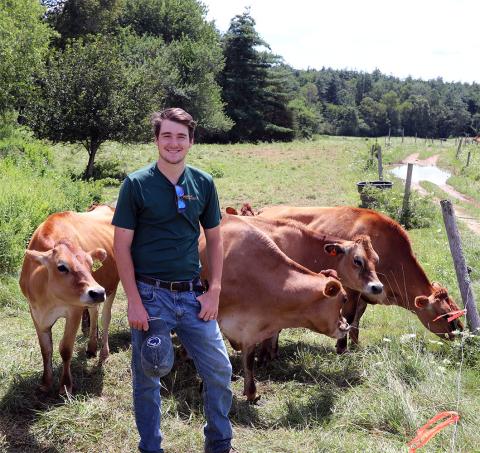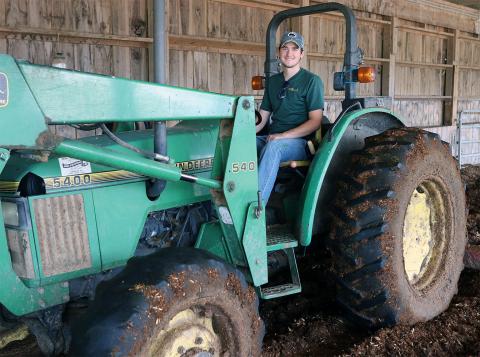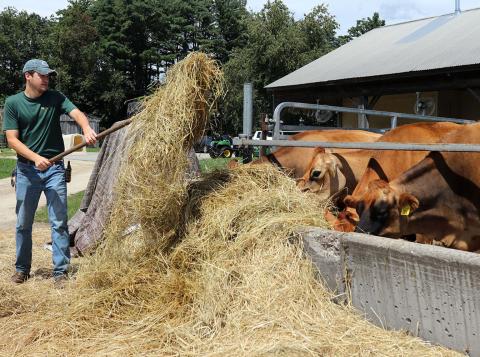
Luke Pacchioli serves as a lead farmer worker for all the College of Life Sciences and Agriculture (COLSA) farms, as well as the Macfarlane Research Greenhouses. A “farm floater,” he provides support at whichever facility and team needs his help, often working at the Organic Dairy Research Farm, the Fairchild Dairy Teaching and Research Center and the Equine Center. Luke enjoys the variety of work and especially enjoys working with large animals.
“I have a deep passion for agriculture and felt that I could explore that in new ways at the NHAES —that’s a big part of what attracted me to this role,” he said. “The focus on working with large animals was another reason I applied— I wanted to gain more large-animal experience so that I would be better suited to pursue a career in that area.”
However, even before joining COLSA, Luke developed an interest in the diverse elements of farming and agriculture. In between semesters of studying at Gordon College in Massachusetts, he worked at a ranch in Montana, a Pennsylvania cricket farm, and, during a study abroad, studied ecological agriculture at the Au Sable Institute for Environmental Studies in Washington state.
Learn more
Position: Lead Farm Worker, COLSA Farms
Year began with NHAES: 2023
Previous positions: Grew up helping his dad in horticultural research. Worked at a Midwest ranch and a Northeast cricket farm. Helped implement habitat restoration plans as an intern with DeRosa Environmental Consulting.
Luke Pacchioli: I moved to work at the NHAES at UNH. There were not a lot of opportunities to work in livestock agriculture in the North Shore region where I went to school, and I wanted to stay in New England for the time being.
You work on a lot of different farms at UNH. Do you prefer a task or job that you do here?
Luke: I really enjoy working at the Organic Research Dairy Farm. It’s integrated into the landscape, and that can make things complicated and interesting. You’re constantly juggling different variables that the weather, land and animals are throwing at you. And I love being outdoors and working within the landscape as well.
The ability to support research is another reason why I like this job. Initially, I was juggling whether to go continue my education by pursuing a graduate degree or to branch into application, so when the opportunity to incorporate the two by working at the university presented itself, I leapt at the opportunity. I’ve tried to familiarize myself with the research being conducted at the various farms and come up with research questions I'd be interested in asking.


A “farm floater,” Luke Pacchioli provides support at whichever facility and team needs his help, often working at the Organic Dairy Research Farm, the Fairchild Dairy Teaching and Research Center and the Equine Center.
What do you like most about farm work and working with animals?
Luke: I’ve always found a lot of meaning in growing my own food. Growing up, I learned about some of the conventional ways of farming from my dad. In high school, I was introduced to more wholistic or alternative means of farming, like those of Allan Savory and Joel Salatin.
I like homesteading too and the connection you have with foods you’ve grown yourself. I enjoy cooking with my wife and when we use foods that we’ve grown or raised ourselves, it makes cooking even more meaningful and satisfying.
I’m also really interested in the integration of agriculture and the environment. For example, you can change the composition of pastureland by utilizing different management strategies, whether it’s timing or spacing. The dynamics of that relationship—agriculture and the environment—is interesting to me.
Did you grow up farming?
Luke: Yes. My dad did small-plot horticulture research. I started working for him when I was about 13 and did that throughout high school. They started me off working in the corn fields, hand pollinating corn for breeding studies. From there I learned to help with anything from pruning the apple orchards to running irrigation and fencing. Along with the more conventional aspects of running a horticulture farm I was exposed to what it meant to be a research farm. I helped collect data and samples, learning the importance of preventing contamination and the importance of ethical research practices.
Other precollege experiences I had were rearing chickens and ducks for meat and eggs as well as maintaining a home garden and helping out with haying and chores at friend's farms.
Then, when I was in college, I really sought to expand my agricultural and ecological knowledge with my course selection and with summer internships and study abroad. When I was stuck at home during the pandemic, one of the only places I could find work was a cricket farm. We grew millions of crickets a month for pet food. With all these avenues, I was trying to gain experience and learn more about my growing passion for the land, food, and the people that make a living on it.
What are some of your hobbies and interests?
Luke: Fishing. I began freshwater fishing last summer and have really gotten into it. I’ve been hunting down the bass in Baxter Lake in Farmington. I also love hiking, biking and cooking with my wife.